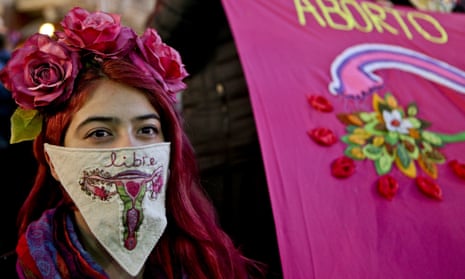Chile is on the cusp of finalising a landmark ruling to legalise abortion under certain circumstances in a move that would signal a major victory for President Michelle Bachelet.
After two years of fractious debate, a bill that would permit termination of a pregnancy when a woman’s life is in danger, when a foetus is not viable or in cases of rape, could be passed this week.
Under existing law, women who have abortions and those who assist them face up to five years in jail, with hospitals obliged to report any suspicious cases to the police.
However, the bill faces a final hurdle after fierce opposition from the conservative right forced it to be referred to Chile’s constitutional tribunal.
Over the next three days, lawmakers and members of civil society will deliberate before a panel of eight male and two female judges. If endorsed, it will end Chile’s status as the last South American nation with an outright ban on abortion.
The deliberations coincide with the visit of Mike Pence, the US vice-president, who is visiting Chile as part of his South American tour. Pence is fiercely anti-choice, and is seen as highly influential in Donald Trump’s decision to reinstate an expanded, harsher version of the Mexico City policy.
Chile’s long-awaited reform would secure a key legacy for Bachelet, whose current term ends in March. The former head of UN women, who promised to push through the change when she took office for the second time in 2014, has faced a heavy backlash from the conservative right and the Catholic church. Some senators argue the measure violates the constitution, which protects the life of the unborn.
Demonstrations have been held across Chile this week in support of the bill.
Lilian Sepúlveda, a human rights lawyer and vice-president of the global legal programme at the Center for Reproductive Rights, said: “We are at the last significant step of what has been a two-and-a-half year process of advancing this progressive bill. At the end of the day you don’t know how a tribunal is going to rule but we are talking about very strong constitutional arguments in line with human rights.
“This bill is really testament to the response and hard work of women’s rights movements.”
Sepúlveda said she hoped the bill would pave the way for reproductive rights to be legalised on a wider scale.
“It’s a very important step in the right direction, but what we have to remember is the law covers three exceptions. In the longer run we still have a way to go for other women who may have social or economic grounds or other reasons for terminating a pregnancy.”
Chile legalised abortion for medical reasons in 1931, but the procedure was then banned without exception in 1989 as a parting shot from dictator Augusto Pinochet.
José Miguel Vivanco, from Human Rights Watch, will argue at the tribunal that the law is consistent with international human rights.
“Chile’s elite has fully embraced globalisation and a free market economy,” said Vivanco. “But the same elite that travels across the world engaging aggressively in business is, locally, extremely parochial, and will passionately defend views that are frozen in 19th-century rural society and universally challenged in the modern world.
“The law, unfortunately, is not going to allow abortion to protect the health of the mother. Only if her life is in danger will the law allow abortion, and then it will require the opinion of two doctors.
“There are very narrow constraints, and that is the result of very aggressive opposition from the right. It is extremely difficult to predict how the court will react.”

Pushing for change in the face of deep-rooted conservatism, Bachelet has faced a rift inside her ruling coalition and objections that the proposed legislation would lead to false rape claims.
However, after congress passed the law Bachelet wrote on Twitter: “Today, women reclaimed a basic right that we should never have lost: being able to choose when we’re living through painful moments.”
The bill is continuous with a wider regional shift to improve the reproductive rights of women. Colombia lifted an outright ban in 2006, while Uruguay – where the termination of pregnancies up to 12 weeks (14 weeks in cases of rape) was approved in 2012 – has led the way on decriminalising abortion.
But El Salvador is among South American countries where punitive ban remains, with women imprisoned even when they have experienced complications or miscarriages.
If legislation is relaxed in Chile, only a handful of countries worldwide, including Nicaragua and Malta, will still have an outright ban – or, as in Northern Ireland, rules so restrictive that they amount to de facto bans.
Last month, an opinion poll by the research firm Cadem found that roughly 70% of Chileans supported legalising abortion under the bill’s criteria.
Rights groups say 60,000 to 70,000 illegal abortions are performed each year in Chile. Between 2010 and 2014, nearly 500 people in Chile faced criminal charges in connection with abortions, according to the reproductive rights group, Miles.
The tribunal must make a final ruling before 28 August.









